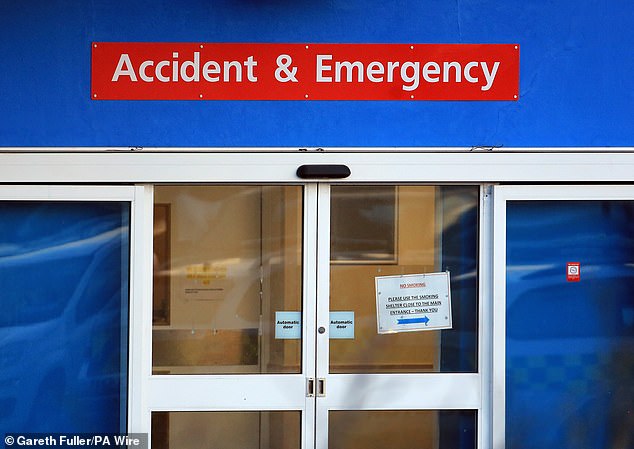Busy A&Es are seeing rising numbers of patients seeking emergency help for hiccups, blocked noses and headaches, an audit has found.
Analysis of NHS data shows growing attendances for minor ailments including coughs, feeling sick and insomnia, heaping unnecessary pressure on stretched services.
Up to two-fifths of attendances are avoidable or could be better treated elsewhere, estimates suggest.
But long waiting times and difficulties getting GP appointments are exacerbating the issue, with health officials urging the public to ‘play their part’ by reserving A&E for genuine emergencies.
In total, there were 24,664,177 unplanned attendances to emergency departments across the country last year, where causes were recorded.
This included more than a quarter of a million (257,915) for earache – up ten per cent on the previous year.
Cases where headache was the chief complaint rose 12 per cent over the previous 12 month period, from 379,127 cases to 423,297 while backache up was up 13 per cent from 324,443 to 365,327.
Complaints for coughs and those attending due to insomnia both rose 15 per cent, from 322,500 to 369,264 and 1,343 and 1,544 respectively.

A rising number of patients are attending A&Es with hiccups, blocked noses and headaches, an audit has found (file photo)

Complaints for coughs rose by 15 per cent, while there were 963 cases of hiccups (file photo)
Surprisingly, there were 963 cases of hiccups – an 18 per cent rise on the previous year.
Dr Adrian Boyle, president of The Royal College of Emergency Medicine, said it was ‘symptomatic of issues that permeate the entire healthcare system’.
He urged ministers to break ‘the viscous cycle’ and ‘deliver on its promise to fix the healthcare system.’
He said: ‘Just like our emergency departments, which are routinely overcrowded – primary and community-based services are massively overstretched.
‘It is therefore no surprise that people turn to A&E for treatment of more minor issues.
‘However, this in turn places additional demand on emergency care teams who are already dealing with the extra pressures that come with winter, combined with an under-resourced social care system that means discharges are delayed.’
Some 61,936 nose bleeds were dealt with in A&E last year, a 10 per cent rise compared to the previous year, while the number of cases of constipation and diarrhoea also rose.

Cases where headache was the chief complaint rose 12 per cent over the previous 12 month period, from 379,127 cases to 423,297 (file photo)
Meanwhile, 351,785 A&E visits last year were attributed to vomiting while 18,126 attendances were because of nausea.
And 324,550 attendances were due to a sore throat.
There was an 11 per cent rise in the number of cases of nasal congestion, from 16,115 in 2022/23 to 17,827 in 2023/24.
Overall, almost 8.6 million A&E attendances in 2023/24 resulted in the patient being discharged with written advice.
The figures come as the NHS braces for what is expected to be a challenging winter as infections rise and temperatures plummet, which can exacerbate a number of pre-existing medical conditions.
Saffron Cordery, deputy chief executive at NHS Providers, said: ‘Pressure on urgent and emergency care services including A&E departments is only likely to intensify in winter, regularly the toughest and busiest time of year for the NHS.
‘But trusts continue to work flat out to see patients as quickly as possible.’
Patients are encouraged to seek help from a pharmacist for seven common conditions without needing to see a GP, as part of the Pharmacy First scheme launched by the Tories last winter.
These conditions include sinusitis, sore throat, earache, infected insect bites, impetigo, shingles and uncomplicated urinary tract infections in women under 65.
Professor Julian Redhead, national clinical director for urgent and emergency care for NHS England, said the public must play its part.
He said: ‘We are seeing record levels of demand at our A&Es and while hospitals are already working close to capacity as we move into winter, it is important that the public plays their part by following NHS advice – only using emergency services for serious injuries or life-threatening emergencies.
‘NHS 111 online and the NHS website can give you advice on how to treat yourself at home, or direct you to the most appropriate NHS service for things like headaches and a sore throat, while calling NHS 111 should be your first port of call for any other pressing conditions – which could mean you are seen quicker and in the right place, while allowing our emergency care staff to support those who need it most.’
This article was originally published by a www.dailymail.co.uk . Read the Original article here. .


